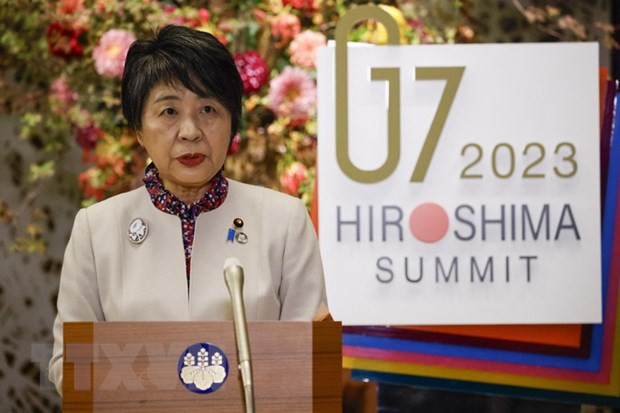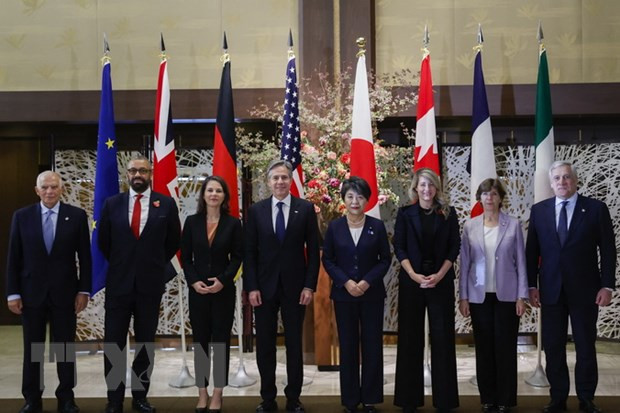Japan's foreign minister said the G7 affirmed the need for "urgent action to resolve the humanitarian crisis" in the Hamas-controlled Palestinian enclave under siege by Israel.

After two days of meetings, the G7 Foreign Ministers' Conference ended with a joint statement addressing topics including the Israel-Hamas conflict, the Russia-Ukraine conflict, the situation on the Korean peninsula, developments in the Indo-Pacific, and promoting increased cooperation with Central Asia...
At the closing press conference of the summit, Japanese Foreign Minister Yoko Kamikawa said G7 members affirmed the need for "urgent action to resolve the humanitarian crisis" in the Hamas-controlled Palestinian enclave under siege by Israel.
The joint statement stressed the importance of complying with international humanitarian law in the ongoing conflict in the Middle East.
G7 foreign ministers have agreed to call for a pause or humanitarian corridor in the Hamas-Israel conflict to facilitate emergency aid, civilian movement and the release of hostages.
The G7 also pledged to work closely with all parties to prepare long-term, sustainable solutions for Gaza.
The G7 stressed the importance of the two-state solution, ensuring that both Palestinians and Israelis live together in peace, security and mutual recognition, as the only way to achieve a stable and lasting peace.
Regarding the Indo-Pacific region, the G7 foreign ministers agreed on the importance of maintaining and strengthening the free and open international order based on the rule of law, while stressing that unilateral attempts to change the status quo will not be accepted anywhere in the world.
The G7 stressed its unwavering support for a united and central ASEAN, and promoted cooperation in line with the ASEAN Outlook on the Indo-Pacific.
The G7 also reiterated its commitment to supporting sustainable, inclusive, resilient and quality infrastructure in partner countries through the G7 Partnership on Global Infrastructure and Investment.
Regarding relations with China, the G7 foreign ministers agreed on the importance of establishing stable and constructive relations with China, and acknowledged the need to cooperate with China to deal with global challenges as well as areas of common interest.
The G7 affirmed that the bloc's policy approach is not intended to harm China nor does it seek to hinder China's economic progress and development.
With the aim of promoting sustainable economic relations with China and strengthening the international trading system, the G7 pledged to continue promoting a level playing field.

The G7 reiterated the universal and unified nature of the 1982 United Nations Convention on the Law of the Sea (UNCLOS) and reaffirmed the important role of UNCLOS 1982 in establishing the legal framework governing all activities in the seas and oceans.
On the nuclear issue on the Korean peninsula, G7 foreign ministers expressed concern about North Korea's missile launches.
Regarding the Russia-Ukraine conflict, the G7 affirmed its unified stance in imposing sanctions against Russia, while working with international partners to promote efforts to restore peace in Ukraine.
For Central Asia, the G7 welcomes the strengthening of regional cooperation and people-to-people exchanges. The G7 reaffirms its determination to strengthen cooperation with Central Asian countries to address regional challenges.
The G7 stressed that in the context of increasing geopolitical risks, diversification and expansion of trade routes in Central Asian countries not only bring economic growth to the region, but also have the potential to improve global supply chains, including energy security.
The G7 is committed to promoting trade and energy links, connectivity and sustainable transport, including the Central Asia Corridor and related projects to strengthen regional resilience.
During the “Dialogue with Central Asia” session, Foreign Minister Kamikawa affirmed that Central Asia is an important partner in maintaining and strengthening a free and open international order based on the rule of law, and expressed his desire to promote efforts to strengthen relations towards the Central Asia-Japan Dialogue Summit next year.
Foreign Minister Kamikawa stated that Japan wishes to continue to carry out mutually beneficial cooperation for both Central Asia and G7 member countries.
The G7 foreign ministers also committed to building further international solidarity beyond the G7 to address broader global challenges, such as climate change, nuclear disarmament and gender equality, including the women, peace and security agenda.
According to VNA